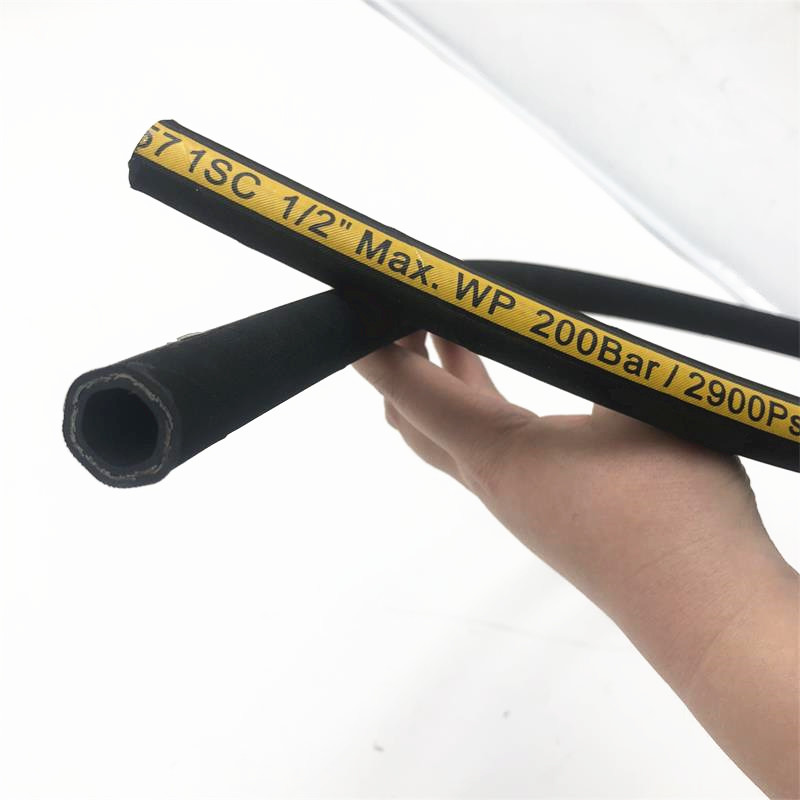335345435
nov . 09, 2024 06:37 Back to list
Custom Hydraulic Rubber Hoses for OEM Applications in Various Industries
Exploring the World of OEM Hydraulic Rubber Hoses
In the realm of industrial applications, hydraulic systems play a vital role in powering machinery and equipment. Among the key components of these systems are hydraulic hoses. Specifically, OEM (Original Equipment Manufacturer) hydraulic rubber hoses are instrumental in ensuring efficient fluid transfer within hydraulic circuits. This article delves into the characteristics, benefits, applications, and considerations associated with OEM hydraulic rubber hoses, providing insights for industry professionals and enthusiasts alike.
Understanding Hydraulic Rubber Hoses
Hydraulic rubber hoses are flexible tubes designed to carry hydraulic fluid in a hydraulic system. Made from synthetic rubber or a combination of rubber and other materials, these hoses are engineered to withstand high pressure and temperature variations. The OEM designation signifies that these hoses are produced to meet the exact specifications and performance standards set by the original equipment manufacturer. This ensures compatibility and reliability, which are critical in hydraulic applications.
Key Characteristics
1. Durability OEM hydraulic rubber hoses are built to last. They are resistant to wear, abrasion, and aging, making them suitable for harsh environments.
2. Pressure Resistance These hoses are designed to handle high-pressure conditions, often ranging from 1,500 psi to over 5,000 psi, depending on the specifications. This quality is essential to prevent ruptures and leaks.
3. Temperature Tolerance High-performance rubber hoses can operate in extreme temperature conditions, ensuring that they maintain integrity and performance in a variety of situations.
4. Flexibility and Bend Radius The flexibility of hydraulic hoses is crucial for installation in tight spaces. OEM hoses offer a range of bend radii, allowing for easy routing in complex machinery.
5. Chemical Resistance Many hydraulic fluids can be corrosive. OEM hydraulic rubber hoses are designed to resist chemical degradation, ensuring longevity and reducing maintenance needs.
Benefits of OEM Hydraulic Rubber Hoses
1. Quality Assurance By using OEM hoses, manufacturers can ensure consistency in quality and performance, adhering to industry regulations and certification standards.
2. Enhanced Safety The reliability of OEM hydraulic hoses minimizes the risk of failures that could lead to hazardous situations, protecting both machinery and personnel.
3. Efficiency High-quality hydraulic hoses optimize fluid transfer, enhancing the overall efficiency of hydraulic systems. This can lead to improved productivity and reduced operational costs.
oem hydraulic rubber hose

4. Custom Solutions OEM manufacturers often provide customizable options, allowing businesses to tailor hoses to specific operational needs, further enhancing system performance.
Applications of Hydraulic Rubber Hoses
OEM hydraulic rubber hoses are utilized across a wide array of industries
1. Construction Hydraulic hoses are pivotal in heavy equipment like excavators, bulldozers, and cranes, enabling the smooth operation of hydraulic systems.
2. Agriculture Tractors and other farm equipment rely on hydraulic hoses for functions like lifting and tilting attachments, which are essential for efficient farming.
3. Manufacturing In manufacturing plants, hydraulic hoses are integral to machinery that requires precise control and power, from presses to robotics.
4. Automotive The automotive industry employs hydraulic hoses in various applications, including power steering systems and braking systems.
Considerations When Choosing OEM Hydraulic Rubber Hoses
When selecting hydraulic hoses, several factors should be taken into account
1. Application Requirements Understand the specific needs of your equipment, including pressure, temperature, and fluid type.
2. Compatibility Ensure that the chosen hose is compatible with the hydraulic fluids that will be used in the system.
3. Certification Standards Verify that the OEM hoses meet industry standards to guarantee performance and safety.
4. Supplier Reputation Work with reputable suppliers who offer quality assurance and support services.
In conclusion, OEM hydraulic rubber hoses are essential components of hydraulic systems, providing durability, safety, and efficiency across diverse industries. Understanding their characteristics and applications is crucial for selecting the right hoses to enhance operational capabilities and ensure the safety and reliability of hydraulic systems. As technology continues to evolve, OEM hoses will undoubtedly remain a cornerstone of hydraulic engineering and industrial applications.
-
Durable Pressure Washer Rubber Hose for Hot Water & High Flexibility
NewsJul.26,2025
-
High-Quality Distribution PTFE Hose for Industrial Applications
NewsJul.25,2025
-
High-Precision Hydraulic Hose Crimping Machine for Fast, Reliable Fittings
NewsJul.24,2025
-
High-Quality Distribution PTFE Hose for Industrial Flexibility
NewsJul.23,2025
-
Durable Pressure Washer Rubber Hose for Hot Water & High Flexibility
NewsJul.22,2025
-
Twin Hydraulic Hose for Efficient Fluid Transfer | Durable & Flexible
NewsJul.22,2025



